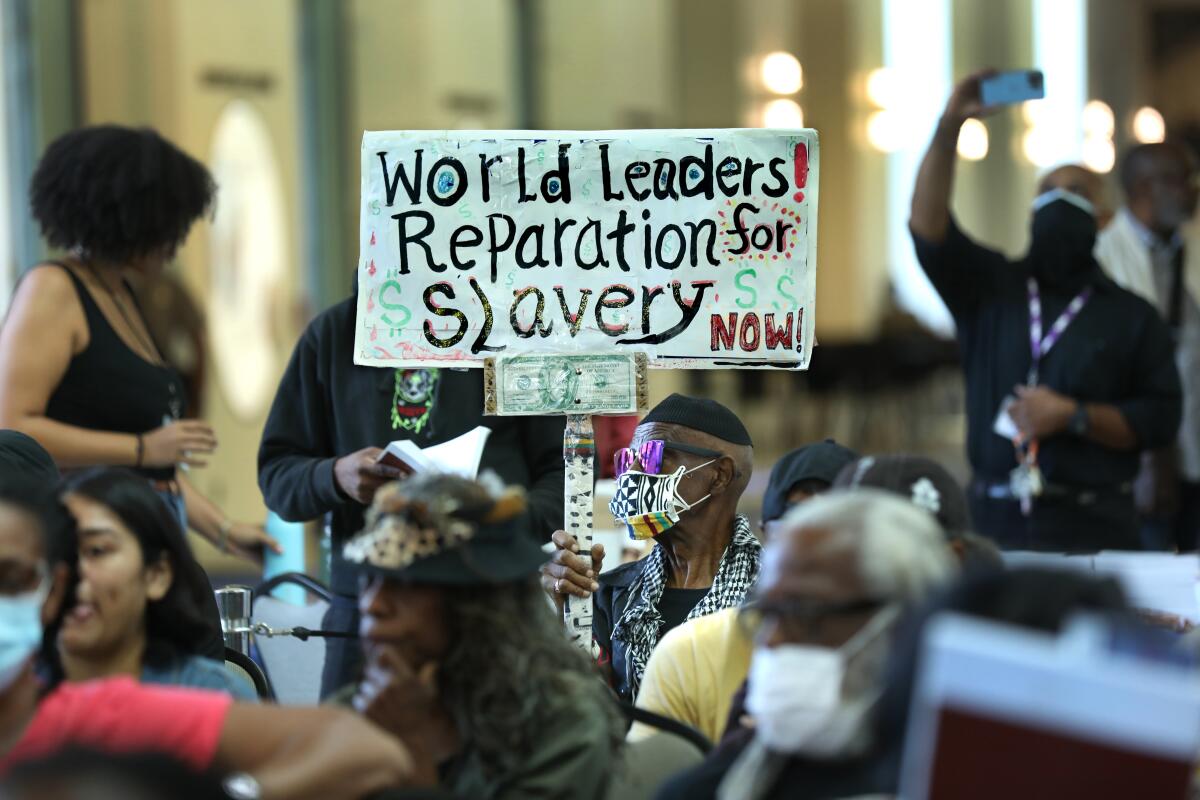Letters to the Editor: California wasn’t a slave state. Should it still pay reparations?

- Share via
To the editor: The hundreds of years of enslavement of African Americans and the racism that followed are moral abominations that should never be forgotten. But there is something askew in the movement for reparations in California. (“Why skeptical Californians should rethink cash reparations for slavery,” editorial, Sept. 17)
States in the southeastern U.S. were responsible for most slavery in this country. They built their prosperity on the forced labor of African Americans, yet they are absent from this conversation. Some of these states, as your editorial noted, teach their young people that slavery benefited the enslaved.
We Californians are not blameless. But if we were to indemnify descendants of slaves for the harms done to them, why not focus on descendants of people who were enslaved in California?
The Armenian genocide committed by the Ottoman Empire a century ago was also an abomination. Rather than compensating the descendants of the victims, Turkey denies its predecessor state committed genocide. Does it make sense for California to step into the breach and offer reparations to Armenian descendants who live here?
Cyril Barnert, Los Angeles
..
To the editor: A majority of California voters agreed that “it’s unfair to ask today’s taxpayers to pay for wrongs committed in the past.” Too bad they weren’t asked whether it’s fair for the descendants of slaves to continue paying for wrongs committed against them in the distant and recent past.
The truth is that taxpayers are always paying for things that weren’t their fault, whether it’s for wildfires or misbehaving officials. It’s part of being a citizen.
We need to undo the wrongs, not just sweep them under the rug. The only real question is not whether to do so, but how to do it effectively.
Geoff Kuenning, Claremont
..
To the editor: As a Native American Indian, I am puzzled by the majority’s blindness to systemic racism. Not just Black Americans are affected — all people of color are.
The government-endorsed genocide of Native American Indians is well-documented. It is true that our nation has made some progress in combating racism. That is commendable. But most historians have overlooked the root cause of our systemic racism.
Under the guise of religion, European explorers in 1452 were authorized by papal edict to “capture, vanquish and subdue” the Indigenous inhabitants of the lands they found. This became known as the Doctrine of Discovery, and it opened the door to chattel slavery and to the colonization of this continent.
Most U.S. citizens aren’t even aware of this doctrine. Historians usually ignore it. Schools are not required to teach it.
Realistically, I don’t expect the land to be returned to us. Personally, I don’t care about reparations. I just wish our nation had the integrity to acknowledge its dark history of inhumanity.
Harold Printup, Mar Vista
..
To the editor: Thank you for bringing a just and high-minded focus to the matter of reparations for African Americans in California. Education about past and persistent systemic harms rooted in slavery is key.
We must also advocate that our state legislators do the right thing and pass legislation that repairs the harms of historic wrongs “based on thoughtful informed decision-making, not a popular poll.” And it’s not too soon to start.
Karen Hilfman, Los Angeles




